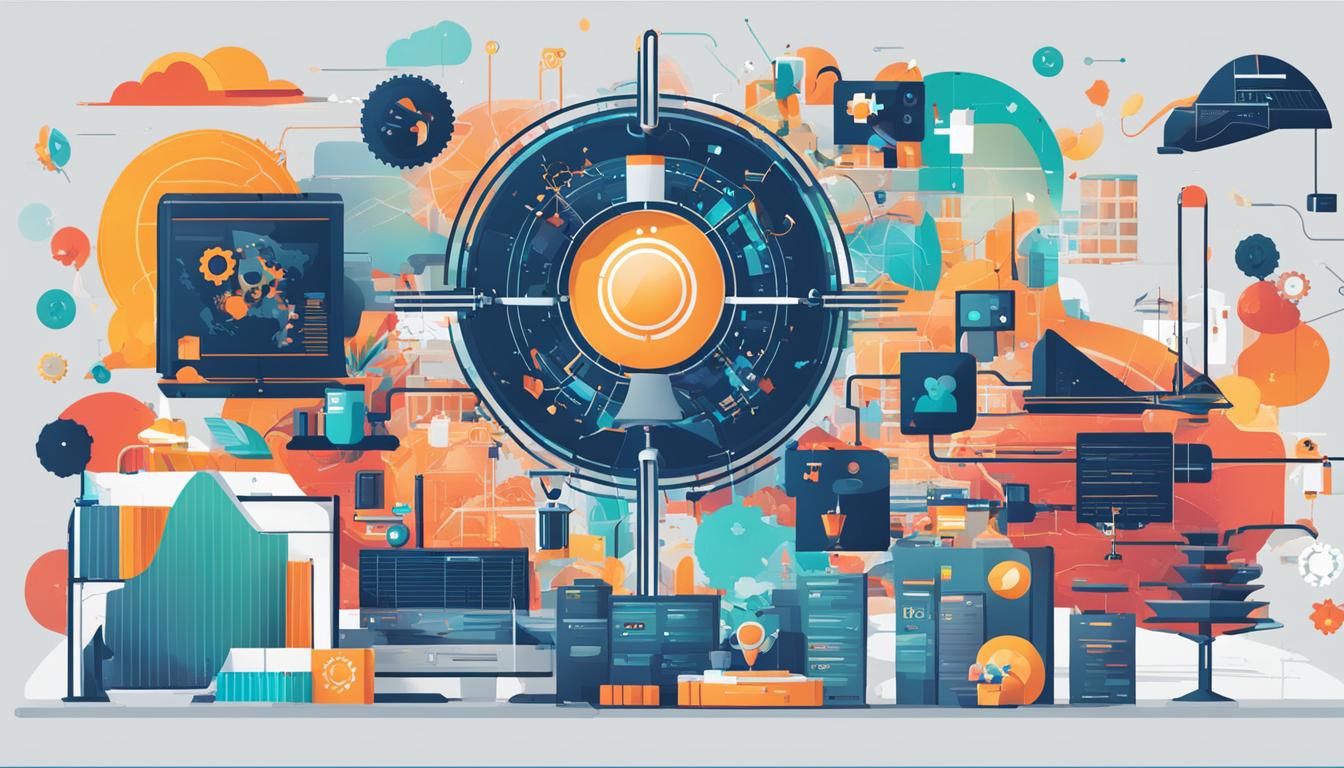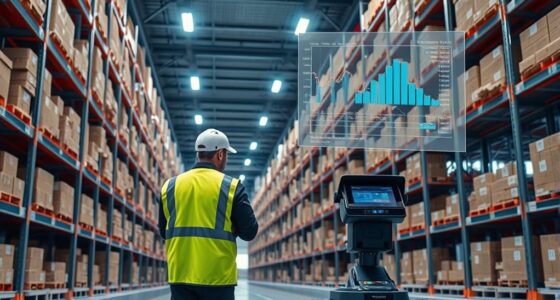In our quest for efficiency, we stand on the precipice of a revolutionary era. Artificial Intelligence (AI) is now a beacon, leading the path towards excellence in manufacturing.
Through improved quality control, streamlined production processes, and enhanced supply chain management, AI revolutionizes the way we manufacture.
By predicting maintenance needs, reducing downtime, and increasing worker safety and efficiency, AI empowers us to reach new heights of productivity.
Join us as we explore how AI unlocks the true potential of manufacturing.

Key Takeaways
- AI technology has significantly improved quality control processes in manufacturing, increasing accuracy and precision while reducing human error and inspection time.
- The use of AI in production processes has streamlined manufacturing, with automated assembly systems, robots, and machines improving efficiency, speed, and cost-effectiveness.
- AI enhances supply chain management by providing real-time monitoring, accurate inventory tracking, and optimized logistics, resulting in improved operational efficiency and cost savings.
- AI-powered predictive maintenance reduces downtime by proactively detecting potential equipment failures, analyzing sensor data, and optimizing maintenance schedules based on actual equipment conditions. This leads to increased equipment reliability and cost savings.
Improved Quality Control
We have seen a significant increase in the accuracy and precision of quality control processes with the implementation of AI technology in manufacturing. Automated defect detection has revolutionized the way we inspect products, eliminating human error and reducing the time required for inspection.
With AI-powered systems, we can now detect even the smallest defects that may have been missed by manual inspection. Real-time inspection allows us to identify and address any quality issues immediately, preventing the production of faulty products and ensuring that only the highest quality items reach the market. This level of automated quality control not only improves product reliability but also enhances customer satisfaction.
With such advancements in quality control, we can now seamlessly transition into discussing the subsequent section about streamlined production processes.
Streamlined Production Processes
Our production processes have been significantly streamlined through the implementation of AI technology. By leveraging automated assembly systems, we’ve reduced the time and labor required for manufacturing our products.

AI-powered robots and machines can perform tasks with precision and speed, improving overall efficiency. Additionally, AI algorithms analyze data to optimize inventory management. By accurately predicting demand and monitoring stock levels, we’re able to minimize wastage and ensure just-in-time supply. This not only reduces costs but also helps us meet customer demands effectively.
With AI, we’ve achieved a seamless integration of our production line, enabling us to respond swiftly to market changes. As a result, our manufacturing processes have become more agile, productive, and cost-effective.
Enhanced Supply Chain Management
One key advantage of AI in manufacturing is its ability to enhance supply chain management.
With AI-powered systems, manufacturers are able to monitor and manage their supply chains in real time, allowing for more accurate inventory tracking and optimization of logistics.

By leveraging AI algorithms, manufacturers can analyze vast amounts of data from various sources such as sensors, RFID tags, and production systems, enabling them to have a real-time view of their inventory levels.
This real-time inventory visibility helps reduce stockouts and overstock situations, leading to improved operational efficiency and cost savings.
AI also enables manufacturers to optimize logistics by intelligently predicting demand patterns, optimizing routes, and suggesting the most cost-effective transportation options.
Predictive Maintenance and Reduced Downtime
AI-powered predictive maintenance significantly reduces downtime in manufacturing. By utilizing real-time monitoring and data analysis, AI algorithms can detect potential equipment failures before they occur, allowing for proactive maintenance and minimizing unplanned downtime. This technology brings several benefits to manufacturers, including:

-
Increased equipment reliability: AI algorithms can analyze sensor data in real-time, identifying patterns and anomalies that may indicate potential equipment failures. By addressing these issues before they escalate, manufacturers can ensure continuous operation and prevent costly breakdowns.
-
Optimized maintenance schedules: AI-powered predictive maintenance enables manufacturers to schedule maintenance tasks based on actual equipment conditions, rather than relying on fixed intervals. This approach maximizes equipment uptime while minimizing unnecessary maintenance activities, resulting in significant cost savings.
-
Improved efficiency and productivity: By reducing unplanned downtime, AI-powered predictive maintenance allows manufacturers to optimize production schedules and minimize disruptions. This leads to increased efficiency, improved resource allocation, and higher overall productivity.
-
Cost savings: By preventing equipment failures and reducing downtime, manufacturers can avoid costly repairs, production losses, and delays in delivery. AI-powered predictive maintenance helps optimize maintenance costs by allowing for targeted interventions only when necessary, resulting in substantial cost savings.

Increased Worker Safety and Efficiency
With AI technology, we can enhance worker safety and efficiency in manufacturing. By implementing AI-powered systems, we can optimize worker collaboration and ensure an environment that prioritizes safety.
AI algorithms can analyze real-time data from sensors and cameras to identify potential hazards, such as malfunctioning equipment or excessive noise levels. This allows for quick intervention and preventive measures, minimizing the risk of accidents.
Moreover, AI can assist workers by providing real-time instructions and guidance, enabling them to perform tasks more efficiently. Through machine learning, AI systems can continuously learn and adapt to worker behavior, leading to optimized performance and reduced errors.
Frequently Asked Questions
How Does AI Technology Help in Identifying Quality Control Issues in Manufacturing Processes?
AI technology in manufacturing revolutionizes quality control, improving efficiency. Machine learning plays a crucial role in identifying and resolving quality control issues in manufacturing processes. It enhances accuracy and speed, ensuring higher product standards.

Can You ExplAIn How AI Algorithms Streamline Production Processes and Increase Overall Efficiency?
AI algorithms in manufacturing streamline production processes and boost overall efficiency. By analyzing data in real-time, identifying patterns, and making autonomous decisions, AI drives optimization, reduces waste, and maximizes output.
How Does AI Technology Enhance Supply ChAIn Management in Manufacturing Industries?
AI technology enhances supply chain management in manufacturing industries by utilizing AI applications in inventory management and AI-driven demand forecasting. This improves efficiency, reduces costs, and minimizes waste, leading to optimized production and seamless coordination throughout the supply chain.
Can You Elaborate on the Role of Predictive Maintenance in Reducing Downtime in Manufacturing Facilities?
Can predictive maintenance increase equipment uptime in manufacturing facilities? By using AI technology, we can analyze data and identify patterns to predict maintenance needs, allowing us to address issues proactively and reduce downtime.
In What Ways Does AI Technology Contribute to Increased Worker Safety and Efficiency in Manufacturing?
AI technology contributes to increased worker safety and efficiency in manufacturing by automating repetitive tasks, reducing human error, and providing real-time data for predictive maintenance. This improves worker well-being and allows for faster and more accurate decision-making.

Conclusion
In conclusion, AI has revolutionized the manufacturing industry by significantly improving quality control, streamlining production processes, enhancing supply chain management, enabling predictive maintenance, and increasing worker safety and efficiency.
With AI’s transformative capabilities, the future of manufacturing holds boundless possibilities. As AI continues to evolve and advance, we can only anticipate even greater efficiency gains and groundbreaking innovations in the manufacturing sector.
The integration of AI into manufacturing processes is undoubtedly an exciting journey that will continue to shape the industry’s landscape in ways we’ve yet to imagine.










